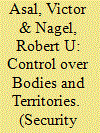|
|
|
Sort Order |
|
|
|
Items / Page
|
|
|
|
|
|
|
| Srl | Item |
| 1 |
ID:
178765


|
|
|
|
|
| Summary/Abstract |
Although smuggling is commonly assumed to happen in remote and difficult-to-access borderlands, in reality, smuggling is most prevalent in areas that states tightly control, including at formal border crossings. To understand this puzzle, this article explores the relationship between states and smugglers at international borders. Based on extensive empirical research in various borderlands in North Africa and Southeast Asia, it argues that different kinds of smugglers prefer different types of relationships with the state. The article outlines six ideal types of such relationships. It contends that these types of relationships are the dominant factor in how different smuggling networks choose routes along a border. The findings have implications for our understanding of smuggling and policies that aim at addressing smuggling, especially regarding the effects of border fortifications and corruption prevention.
|
|
|
|
|
|
|
|
|
|
|
|
|
|
|
|
| 2 |
ID:
178768


|
|
|
|
|
| Summary/Abstract |
Despite the popular narrative of “rape as a weapon of war,” research shows that only a minority of insurgent groups perpetrate sexual violence in armed conflict. We argue that territorial control is an overlooked factor that can increase the likelihood a group commits sexual violence for two primary reasons: (1) rebel groups seeking to establish control over territory are more likely to commit sexual violence; and (2) groups seeking to maintain territorial control emulate state behavior through violently controlling human, sexual, and reproductive capital, which manifests in forced recruitment and different forms of sexual violence, including rape and sexual slavery. We systematically test this argument using the Sexual Violence in Armed Conflict (SVAC) and the Big Allied and Dangerous Insurgent II (BAADI2) datasets. The results provide robust support for the argument. This constitutes an important addition to our understanding of conflict-related sexual violence and rebel governance.
|
|
|
|
|
|
|
|
|
|
|
|
|
|
|
|
| 3 |
ID:
178762


|
|
|
|
|
| Summary/Abstract |
Political realists disagree on what America should “do” and “be” in the Middle East. All are skeptical toward extravagant geopolitical projects to transform the region. Yet they differ over whether hegemony in the Gulf and its wider environs are worth the substantial investment of blood and treasure. Hegemonic “primacy realism” finds the commitment effective and affordable, and that Washington should stay to stabilize the region to ensure a favorable concentration of power. There is an alternative “shield of the republic” realism, however, which views the pursuit of armed supremacy in the Middle East as harming political order at home, reducing security more than generating it, and costing too much for too little gain. It involves interests that are either manageable from a remove or largely generated by being there in the first place. In this article, we lay out the latter position, arguing that the unruly Gulf is increasingly peripheral to US national interests. The region is losing its salience grand strategically, entanglement and continuous war damage republican liberties, and the calculus of whether continued hegemony is “worth it” has shifted decisively toward the downside. The time for abandonment has come.
|
|
|
|
|
|
|
|
|
|
|
|
|
|
|
|
| 4 |
ID:
178764


|
|
|
|
|
| Summary/Abstract |
Can propaganda produced by foreign adversaries shape public opinion in a target country? We develop a theoretical framework to understand outward-facing propaganda, which many autocrats employ to shape public opinion abroad. We argue that beliefs about foreign affairs are more susceptible to outward-facing propaganda than beliefs about domestic conditions. Empirically, we focus on RT (formerly Russia Today), a media platform the Russian government founded in 2005. After characterizing its content, we ask whether exposure to RT influences the beliefs of American consumers. Exposure to RT, we find, induces respondents to support America withdrawing from its role as a cooperative global leader by 10–20 percentage points. This effect is robust across measures, obtains across party lines, and persists even when we disclose that RT is financed by the Russian government. RT has no effect on Americans’ views of domestic politics or the Russian government.
|
|
|
|
|
|
|
|
|
|
|
|
|
|
|
|
| 5 |
ID:
178766


|
|
|
|
|
| Summary/Abstract |
Experts opine that the Islamic State of Iraq and Syria (ISIS) responded to its loss of control over major population centers in Iraq and Syria that constituted its self-described “caliphate” by internationalizing its patterns of terrorist violence, committing higher-profile attacks abroad, and exploiting sectarian conflicts in other countries. In this study, we test this conventional wisdom. We theorize that the loss of population centers prompted ISIS to conduct more attacks abroad, to shift its attack venues abroad, and to cause higher casualties abroad. Using original time series data on ISIS control over major cities, we find empirical support for our theoretical assumptions.
|
|
|
|
|
|
|
|
|
|
|
|
|
|
|
|
|
|
|
|
|